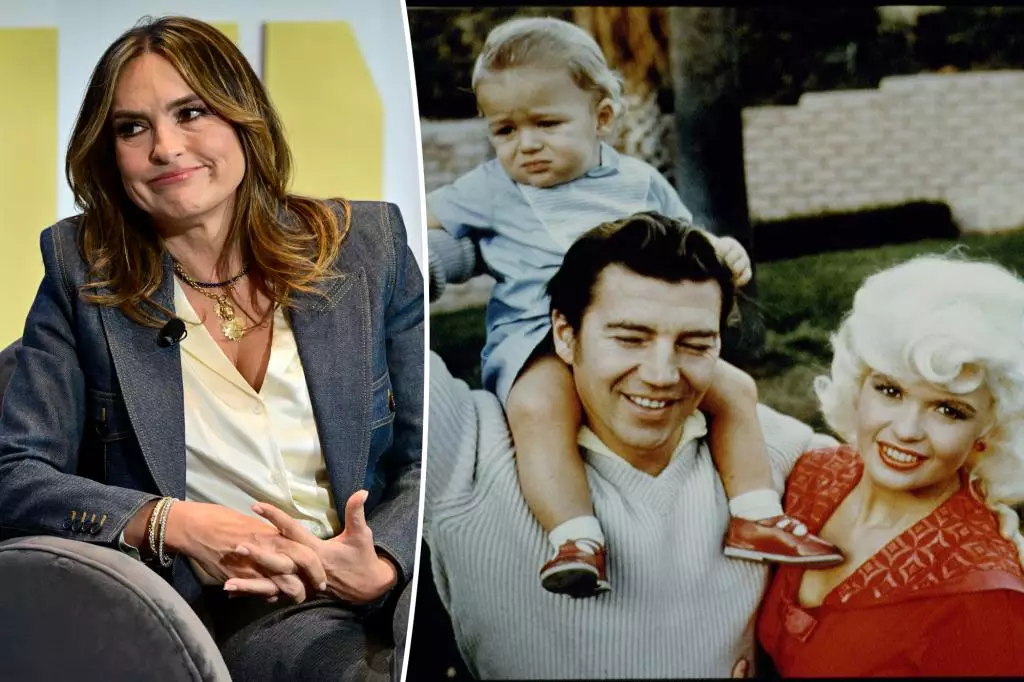In a poignant moment at the Hope for Depression Research Foundation’s 18th Annual HOPE Luncheon Seminar, actress Mariska Hargitay opened up about the profound impact her mother Jayne Mansfield’s tragic death had on her life. Losing her mother at just three years old, Hargitay navigated the complex landscape of grief as a child among family members who each dealt with their sorrow in distinct and isolated ways. Her comments highlight the often overlooked emotional aftermath that can ripple through families following a tragedy, especially in the absence of adequate support systems or tools for healing.
Born into a world of glitz and glamour, Mansfield was a well-known actress and Playboy Playmate whose untimely death in a car accident at the age of 34 left an indelible mark on Hollywood and her family. Hargitay’s recollections serve as a stark reminder of the lasting effects of loss and the unique challenges faced by those left behind. With the knowledge of modern psychological understanding lacking during her upbringing, Hargitay and her siblings were left to navigate their grief largely unassisted, complicating their emotional development.
As Hargitay accepted the 2024 Hope Award for Depression Advocacy, she candidly shared her ongoing journey toward understanding and addressing her past traumas, including surviving sexual abuse in her adulthood. It was not until much later in life that she acquired the necessary language and tools to fully confront and make sense of her experiences. This delay, she notes, is common in individuals who suffer from complex trauma, especially when layers of societal stigma may prevent open discussions about such sensitive topics.
The creation of her advocacy organization, the Joyful Heart Foundation, two decades ago was not merely a philanthropic endeavor; it was a deeply personal response to her own struggles with trauma. Hargitay emphasizes the importance of finding the right therapists to aid in her healing process, highlighting how their diverse approaches helped her explore various healing methodologies. Her words resonate with many who have faced similar challenges, serving as a beacon of hope and inspiration that healing is possible.
Throughout her personal narrative, Hargitay underscores that grief is not just a burden but can also serve as a catalyst for transformation. In a previous interview with People, she explained her philosophy regarding living with loss: “The only way out is through.” This perspective stresses the necessity of fully experiencing one’s emotions rather than running from them. Her insights challenge the common impulse to avoid pain, instead advocating for an embrace of the very feelings that may be most uncomfortable.
As the mother of three, Hargitay’s understanding of loss has evolved, leading to the realization that while the journey of grief can be burdensome, it can also lead to enlightenment and a profound appreciation for life. She acknowledges that the path to healing is rarely straightforward but can lead to unexpectedly bright outcomes if one is willing to brave the discomfort.
Hargitay’s introspection also turns to her late mother, whom she recalls not just as a glamorous star but as a symbol of tenacity and a zest for life. Drawing parallels between their lives, Hargitay expresses admiration for Mansfield’s ability to navigate a world that often marginalizes women, especially in the entertainment industry. She describes her mother as an individual “ahead of her time,” a view that resonates deeply with her own professional endeavors and advocacy.
Mansfield, who had five children prior to her premature death, remains a compelling figure not just for her beauty but for the indelible influence she left on her daughter’s life. In celebrating her mother’s spirit, Hargitay forges a connection to her own legacy of advocacy, ensuring that Mansfield’s memory endures through her ongoing efforts to foster healing among survivors of trauma.
Mariska Hargitay’s journey through grief and trauma offers significant lessons on the importance of support, the courage to confront pain, and the transformative possibilities that can arise from tragedy. By openly discussing her struggles, she invites others to embark on their path to healing, instilling a sense of hope that resonates far beyond her personal narrative. In her advocacy work, Hargitay continues to honor her mother’s legacy, proving that even in the depths of sorrow, one can find the strength to heal, inspire, and uplift others.

